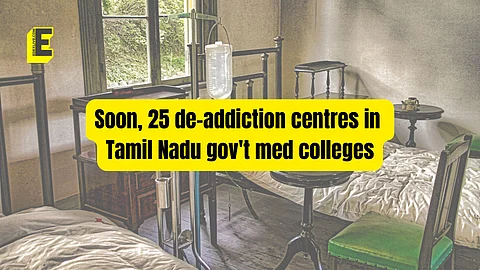

The Tamil Nadu Health Department is set to officially inaugurate 25 de-addiction centres in government medical college hospitals to provide institutional counselling, treatment and rehabilitation services to persons affected by substance abuse.
The work, including the infrastructure and recruitment of staff, is almost over. These centres, funded by Tasmac, are in addition to the already-existing seven de-addiction centres in government hospitals, stated a report by The New Indian Express.
The training of the new recruits is under way at the Institute of Mental Health (IMH), Kilpauk. Each centre will have one counsellor, psychologist, psychiatric social worker, staff nurse, hospital worker, sanitary worker and security staff. They are recruited on contract basis through District Health Society (DHS) under the National Health Mission-Tamil Nadu.
The establishment of the de-addiction centres in 25 government medical college hospitals at a cost of Rs 20 crore was announced in the Assembly on February 19.
Each centre will have 20 beds. In Chennai, the centres will be set up at the Institute of Mental Health, Rajiv Gandhi Government General Hospital, Government Medical College Hospital in Omandurar Estate, Stanley Medical College Hospital, and Kilpauk Medical College Hospital.
The centres will provide motivational enhancement therapy (MET), self efficacy to change their addictive behaviour and others. Relapse prevention through refusal skills and assertive skills training will also be done.
They will provide psychosocial interventions to enhance pharmacological treatment efficacy by improving medication compliance, maintenance of treatment, and will also conduct family sessions educating the primary caretaker or family member, stated The New Indian Express report.
At the community level, the discharged patients will be followed up in their locality by maintaining confidentiality and conducting group therapies if possible.
